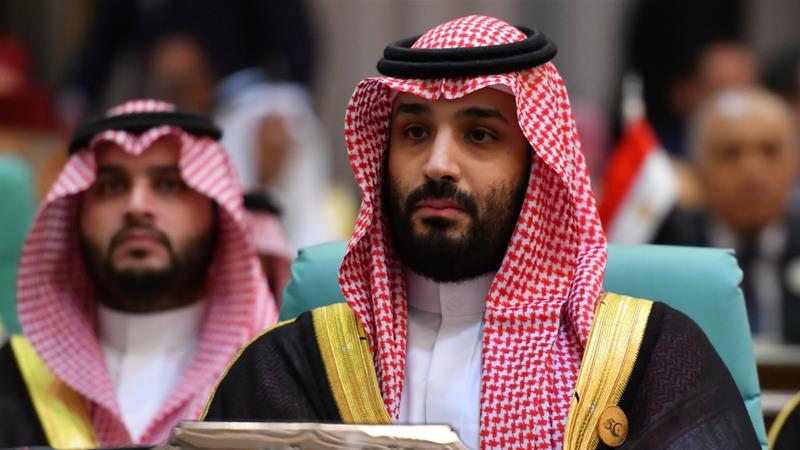Home » Middle East »
Saudi Arabia's Crown Prince MBS blames Iran for tanker attacks
Crown Prince Mohammed bin Salman says he ‘won’t hesitate’ to deal with threats to Saudi interests after tanker blasts.
Saudi Crown Prince Mohammed bin Salman (MBS) has accused arch-rival Iran of attacks on oil tankers in the Gulf of Oman, adding he “won’t hesitate” to tackle any threats to the kingdom.
Two tankers were struck by explosions on Thursday, the second attack in a month in the strategic shipping lane amid a tense US-Iran standoff, prompting fears of a regional conflagration and sending oil prices soaring.
“We do not want a war in the region… But we won’t hesitate to deal with any threat to our people, our sovereignty, our territorial integrity and our vital interests,” MBS told pan-Arab daily Asharq al-Awsat in an interview published on Sunday.
“The Iranian regime did not respect the presence of the Japanese prime minister as a guest in Tehran and responded to his (diplomatic) efforts by attacking two tankers, one of which was Japanese,” MBS added in his first public comments since the attacks.
The prince also accused “Iran and its proxies” over May 12 attacks on four tankers anchored in the Gulf of Oman off the United Arab Emirates port of Fujairah.
Thursday’s attack on the two tankers – Japanese-owned Kokuka Courageous that was carrying highly flammable methanol when it was rocked by explosions and the Norwegian-operated Front Altair – came around the time Japanese Prime Minister Shinzo Abe was meeting with Iranian leaders in Tehran.
United States President Donald Trump has said the twin attacks had Iran “written all over it”, rejecting Tehran’s vehement denial.
Iranian Foreign Minister Mohammad Javad Zarif tweeted that the US had “immediately jumped to make allegations against Iran without a shred of factual or circumstantial evidence”.
Search for evidence
The US military on Friday released grainy footage it said showed an Iranian patrol boat removing an “unexploded limpet mine” from one of the tankers.
Speaking from Muscat, Al Jazeera’s Mohamed Vall said that more investigations were being carried out about the attacks.
“The Americans have sent a team to board one of the two tankers that have been hit to collect more evidence.
“Also, the foreign minister of the UAE has said his country has submitted more evidence to the Security Council … [which they say shows the incident] was state-sponsored. There wasn’t a mention of Iran, but Saudi Arabia and the UAE have from day one supported the American version of events.”
Both sides have also continued to beat the drums of war.
“The Americans say they are capable of waging a war and forcing Iran to stop sabotaging the waterways of the Gulf and disrupting oil supplies to the world.
“Iranians, on the other hand, are saying they have done nothing wrong, but if forced to war, they are ready to defend themselves,” said Vall.
Gulf response
The UAE’s Foreign Minister Sheikh Abdullah bin Zayed Al Nahyan on Saturday called on world powers “to secure international navigation and access to energy”, a plea echoed by regional ally Saudi Arabia after the incident sent crude prices soaring.
Iran has repeatedly warned in the past that it could block the strategic Hormuz Strait in a relatively low-tech, high-impact countermeasure to any attack by the US.
Doing so would disrupt oil tankers travelling out of the Gulf region to the Indian Ocean and global export routes.
The UAE’s Sheikh Abdullah, whose country is bitterly opposed to Iranian influence in the region, called for a de-escalation of tensions.
“We remain hopeful in attaining a broader framework for cooperation with Iran,” he said at a summit in Bulgaria.
Meanwhile, Saudi Arabia’s Energy Minister Khalid al-Falih called for a “swift and decisive” response to threats against energy supplies after Thursday’s “terrorist acts”.
Vessels head to port
The Japanese tanker’s Tokyo-based operator Kokuka confirmed on Saturday the stricken vessel was heading to port in the UAE.
“We still don’t know if the tanker goes to Khor Fakkan or Fujairah as they are very close,” said a spokesperson, referring to two Emirati ports on the Gulf of Oman.
Maritime experts would then seek to transfer the highly flammable cargo to shore, according to an unnamed official quoted by Japanese state media.
The other ship, the Front Altair, has left Iran’s territorial waters, multiple sources said Saturday.
The ship is “heading toward the Fujairah-Khor Fakkan area in the United Arab Emirates”, head of ports for Iran’s southern province of Hormozgan told the semi-official news agency ISNA.
The tanker “has left Iran’s territorial waters,” he said, adding that it was being towed and sprayed with water to cool the hull.
A spokesperson for Frontline Management, the Norwegian company which owns the ship, said “all 23 crew members of the tanker departed Iran” and flew to Dubai on Saturday.
“All crew members are well and have been well looked after while in Iran,” she said.
Source: Read Full Article



